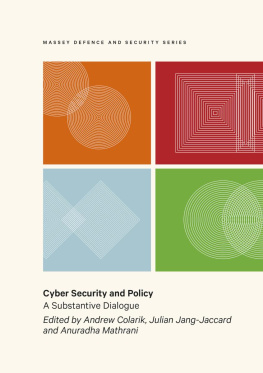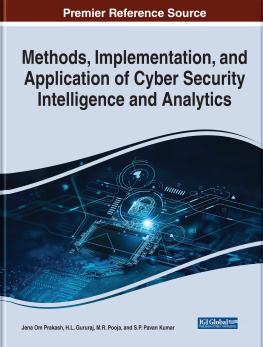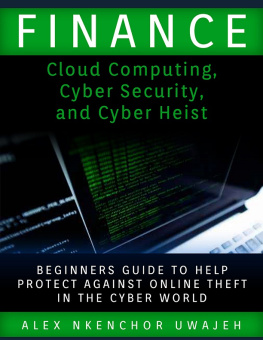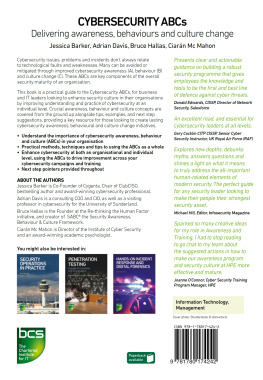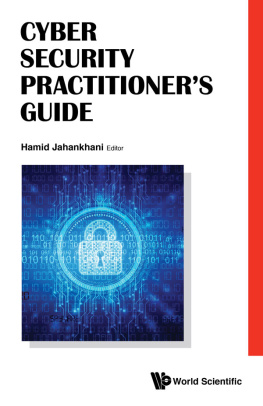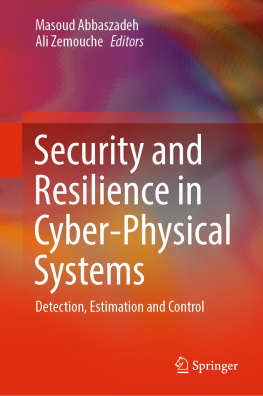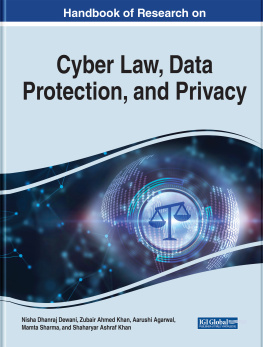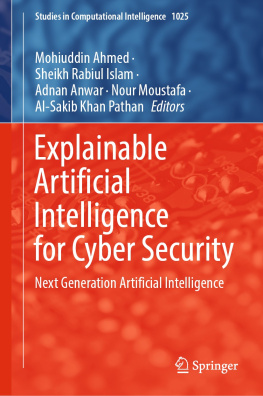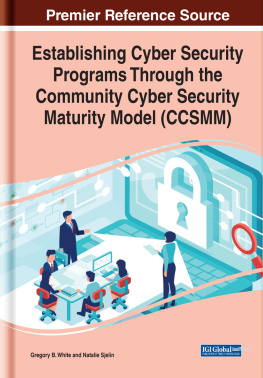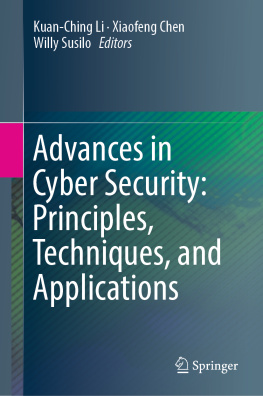Anuradha Mathrani (editor) - Cyber security and policy : a substantive dialogue
Here you can read online Anuradha Mathrani (editor) - Cyber security and policy : a substantive dialogue full text of the book (entire story) in english for free. Download pdf and epub, get meaning, cover and reviews about this ebook. year: 2017, genre: Politics. Description of the work, (preface) as well as reviews are available. Best literature library LitArk.com created for fans of good reading and offers a wide selection of genres:
Romance novel
Science fiction
Adventure
Detective
Science
History
Home and family
Prose
Art
Politics
Computer
Non-fiction
Religion
Business
Children
Humor
Choose a favorite category and find really read worthwhile books. Enjoy immersion in the world of imagination, feel the emotions of the characters or learn something new for yourself, make an fascinating discovery.
- Book:Cyber security and policy : a substantive dialogue
- Author:
- Genre:
- Year:2017
- Rating:4 / 5
- Favourites:Add to favourites
- Your mark:
- 80
- 1
- 2
- 3
- 4
- 5
Cyber security and policy : a substantive dialogue: summary, description and annotation
We offer to read an annotation, description, summary or preface (depends on what the author of the book "Cyber security and policy : a substantive dialogue" wrote himself). If you haven't found the necessary information about the book — write in the comments, we will try to find it.
Cyber security and policy : a substantive dialogue — read online for free the complete book (whole text) full work
Below is the text of the book, divided by pages. System saving the place of the last page read, allows you to conveniently read the book "Cyber security and policy : a substantive dialogue" online for free, without having to search again every time where you left off. Put a bookmark, and you can go to the page where you finished reading at any time.
Font size:
Interval:
Bookmark:
A world without the advantages and conveniences provided by cyberspace and everything it connects us to is now unimaginable. But do we understand the threats to this massive, interconnected system? And do we really understand how to secure it? Cyber security is no longer just a technology problem; the effort to secure systems and society are now one and the same.
This book discusses cyber security and cyber policy in an effort to improve the use and acceptance of security services. It argues that a substantive dialogue around cyberspace, cyber security and cyber policy is critical, and will enable a better understanding of some of the large security issues we face.
I have found that it is the small everyday deeds of ordinary folk that keep the darkness at bay. Small acts of kindness and love.
Mithrandir (J. R. R. Tolkien)
- Foreword
Professor Rouben Azizian - Introduction
Andrew Colarik - 1. Online services authentication
Arno Leist and Daniel P. Playne - 2. Emerging cyber-security threats in cloud computing and big data
Julian Jang-Jaccard - 3. Revenue fraud in e-commerce platforms: Challenges and solutions for affiliate marketing
Bede Amarasekara and Anuradha Mathrani - 4. Picking high-level fruit in dark trees: Using complex systems analytics to detect and understand crime
David Robinson and Chris Scogings - 5. Cyber counterintelligence: Concept, actors and implications for security
Courteney J. OConnor - 6. Challenges in governance of cyber neutrality
Thomas Potter - 7. The internet of things: Cyber-security challenges and policy solutions
Des T. R. Gilmore - 8. Limitations of cryptography within the information security environment
Robin Behersing - 9. The failure of public and private sector regulation in cyber security: A Singaporean case study
Paul A. Watters, Jacqueline Ziegler, Seung Jun Lee & Maya F. Watters - 10. Globalisation and the rise of the jihadist virtual network
Nicola Port - 11. Snowden and GCSB: Illuminating neoliberal governmentality?
Damien Rogers
This publication on cyber security and policy represents a comprehensive and interdisciplinary security analysis that has a broad academic and practical relevance. It demonstrates the increasing complexity, unpredictability and vulnerability of the global and national security environments through the prism of cyber activity. The authors offer well-researched and at times passionate perspectives on evolving cyber trends, government reactions and cyber policies, societal dilemmas with technology, criminal and extremist exploitation of the cyber space, and the vulnerabilities of the cyber infrastructure.
Rapid progress in technology and the unstoppable force of globalisation occasional isolationist bravado notwithstanding pose challenges to governments and societies, law and order, and established security paradigms, rules and behaviours. The world of cyber security is in flux. Current and emerging technologies are allowing threats and capabilities to change the way cyber defences are designed, implemented and presented to customers. It is critical that cyber-security experts and leaders around the world understand the complex trends and underlying dynamics shaping the future of their sector. The loud cyber alarm bells are a powerful reminder that a proper response not to mention a more desirable but harder to achieve preparedness for emerging security challenges, such as cyber, that are often immune to traditional tools of mitigation requires a new way of thinking and acting in the national and international security domains.
New Zealands Cyber Security Strategy 2015 was a clear reflection of the scale and complexity of the problem. Its four goals cyber resilience, cyber capability, addressing cybercrime and international cooperation resonate with governmental, business and individual cyber concerns. Almost one million New Zealanders are affected by cybercrime each year, and a recent report put the cost of cybercrime to New Zealand at $257 million in 2015.
In the past, New Zealands geographic location has helped keep the country safe from traditional forms of attack. It does not, however, protect the nation from cyber terrorism or cybercrime. The implementation of the strategy is a much more challenging task, as was evidenced by the heavy attendance at the New Zealand Cyber Summit on 5 May 2016, where many speakers and participants stressed the need for more expert advice, government support and collaboration.
Getting businesses to cooperate on cyber security seems almost as hard as prompting rival nations to join efforts against cyber terrorism and cybercrime. Self-interest and the desire to gain a competitive edge in the cyber domain still obstruct reasonable pragmatism and common security. Clearly, old habits will need to change.
This very helpful volume offers a different way of approaching cyber issues. It is written by both established and emerging scholars, and is a good example of a much-needed collaboration on cyber issues that crosses not just disciplines but also academic research and experience. Fresh and innovative perspectives are as important as mature scholarly opinion. It combines broad strategic and political issues with specific technical facts, and brings together experts from a wide variety of academic disciplines. It is a reminder that the security train has left the old station, owned and operated by uniformed forces: the battle for cyber security is too important to be left to traditional security agencies.
Professor Rouben Azizian
Director, Centre for Defence and Security Studies
Massey University
Andrew Colarik
Centre for Defence and Security Studies
Massey University
The realm of digital communications has fostered unforeseen changes in the expansion of the economy, societal connectivity and even broad political change. A 2011 report issued by McKinsey Global Institute stated that over two billion people are connected to the internet and an additional 200 million are added each year. Of the 13 countries studied, the internet comprised 3.4 percent of gross domestic product (GDP), and 21 percent of GDP growth in the last five years (McKinsey Global Institute, 2011). With a reported 1.72 billion Facebook users worldwide sharing huge amounts of personal and professional information, the ability to connect with people anywhere around the globe is staggering (Statista, 2016). This in turn has led to social media impacting the way news is communicated and, in fact, affecting the stability of repressive regimes. No one could have foreseen that the arrest and torture of Kareem Al-Beheiri would be the trigger point to launch the Arab Spring through a cyberactivism network throughout the Middle East and the rest of the world (Khondker, 2011). All these activities and much more have been facilitated by cyberspace to a degree where individuals, organisations and nations are wholly dependent on its persistent and reliable operation. Throughout this book, the authors will explore this problem space and offer a variety of perspectives, discussions and solutions on some of the current issues happening in cyberspace.
Ever since the invention of the telegraph in 1827, the range and reach of communications has brought people closer together, integrated processes and daily activities, and increased the speed with which people can act on both good and bad information. What started as a single wired medium evolved to cross oceans, switched a multitude of commercial lines and migrated into the wireless mediums that make global communications possible. Next came the birth of the Advanced Research Projects Agency Network (ARPANET) in 1969. This was followed by the invention of the Transmission Control Protocol (TCP) in 1974 and the World Wide Web in 1992, both of which are the foundations of the internet of today.
Font size:
Interval:
Bookmark:
Similar books «Cyber security and policy : a substantive dialogue»
Look at similar books to Cyber security and policy : a substantive dialogue. We have selected literature similar in name and meaning in the hope of providing readers with more options to find new, interesting, not yet read works.
Discussion, reviews of the book Cyber security and policy : a substantive dialogue and just readers' own opinions. Leave your comments, write what you think about the work, its meaning or the main characters. Specify what exactly you liked and what you didn't like, and why you think so.

